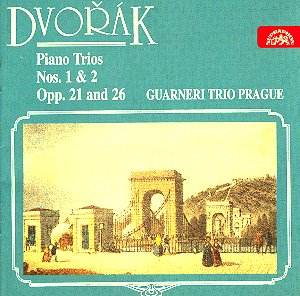Of the four surviving piano trios by Dvořák,
only the third and fourth (the Dumky)
are really familiar, repertoire pieces. The present disc, labelled on
the back as Volume 12 of Dvořák’s complete chamber music, gives
us the two early trios, written in 1875 and 1876, when the composer
was in his mid-thirties. They are delightful works, and even
if they cannot equal the quality and inspiration of the other two, are
full of characterful touches that are typical of the composer.
This is evident from the opening of the B flat Trio,
where the sunny, long-breathed melody seems instantly recognisable and
memorable. The tempo adopted by the Guarneri Trio is ideal, not too
forceful, but with plenty of impetus and forward momentum. The second
subject, whilst carrying echoes of Schubert and even Schumann,
could really be by no-one else. I like the way the Guarneris point up
the little quirky turns of phrase and rhythm that mark out Dvořák’s
music, and the whole movement has irresistible charm. The second movement’s
almost hymn-like quality is well conveyed without lapsing into
sentimentality, as so often happens with this composer’s tunes. The
third movement is a scherzando (with contrasting trio)
which has the characteristics of a polka, and the players respond with
a buoyancy and lilt that is infectious. The allegro vivace finale
provides a suitably lively conclusion to an attractive work.
The second Trio in G minor was written in a
relatively short period, only eight months after the first. The piece
makes a good contrast to the earlier work, being tinged
with sadness at the death, in the previous September, of Dvořák’s
two-day-old daughter Josefa. The composer restricts himself to fewer
themes, and these tend to be of a sombre or reflective nature. This
does not make the piece any less enjoyable; indeed, as the Guarneris
seem instinctively to show us, it is possibly the finer work, having
shades of the Seventh Symphony in its more profound moments.
Of all the movements, I found the slow movement to be the most memorable,
the long cello theme beautifully shaped by Marek Jerie. Even the scherzo,
so often in Dvořák’s works the most
characterful and ebullient movement, is here slightly more muted, but
still with plenty of rhythmic variety. The finale finds the players
on excellent form, with many felicitous touches, and Dvořák cannot
help eventually steering the movement into G major, and ending
on a note of joyous optimism.
The recording, like the playing, is first-rate, with
excellent clarity and a wide dynamic range. Balance between the three
instruments is also natural, something not always easy with this combination.
The liner notes by Graham Melville-Mason are also a model of informed
conciseness – a far cry from the Supraphon notes of old. Recommended
.
Tony Haywood
see also trios 3
and 4

